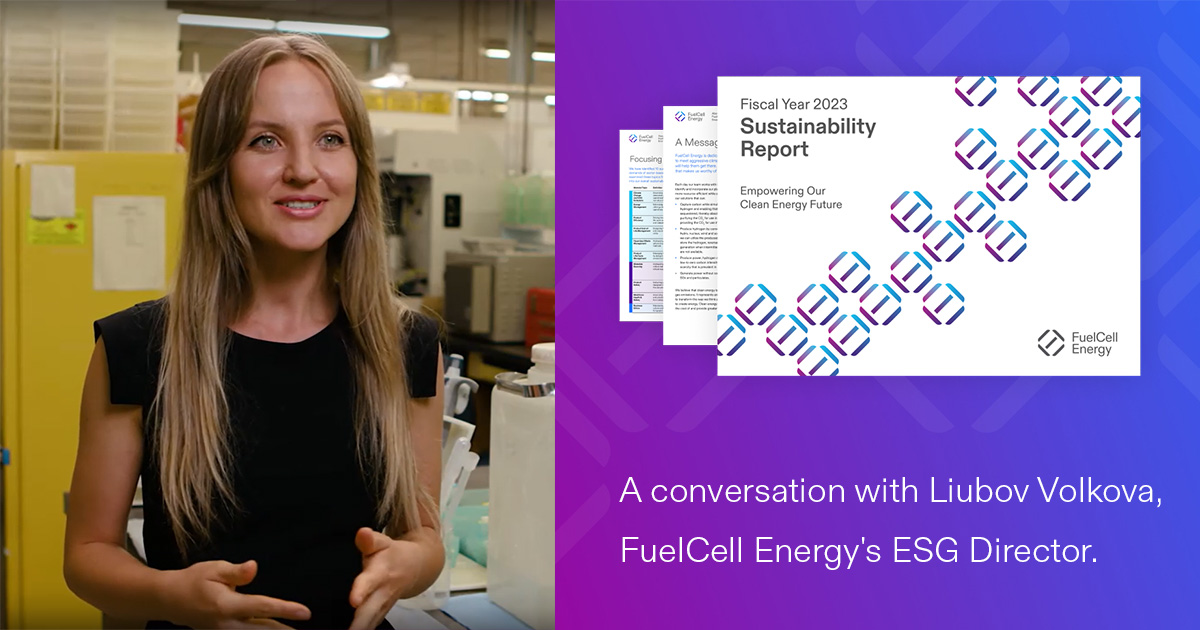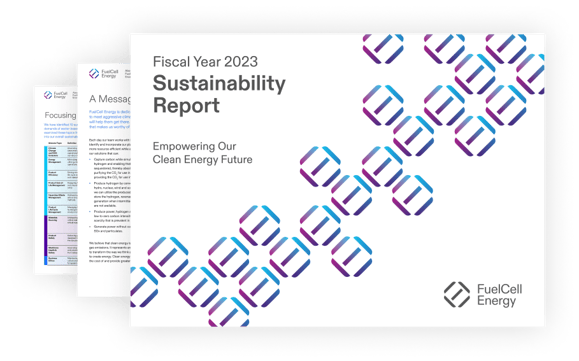
Following the release of FuelCell Energy's second annual Sustainability Report, our team sat down with Liubov Volkova, FuelCell Energy’s Director of Environmental, Social and Governance for a Q&A to discuss key highlights and strategic initiatives outlined in the report – shedding light on our commitment to advancing sustainable practices and fostering responsible corporate culture.
Liubov is a veteran of ESG, having more than 15 years of experience in various sectors, bringing with her a wealth of knowledge when she joined FuelCell Energy in early 2023.
Q: What is ESG?
A: Environmental, Social and Governance – or ESG – is a term that covers all aspects of sustainability and governance in a systemic way. ESG is an approach defined by various frameworks and standards, such as the Global Reporting Initiative (GRI), Task Force on Climate-Related Financial Disclosures (TCFD), and CDP. While many of these frameworks and standards operate on a voluntary basis, companies are strongly urged to adopt an ESG approach to promote completeness, transparency, comparability, accuracy of data, and the overall efficiency of ESG or sustainability strategies and initiatives.
ESG frameworks and standards not only help our stakeholders understand better how we manage risks and opportunities around sustainability issues, but also help us better measure our environmental and social impacts, optimize governance model, and eventually address ESG challenges more efficiently.
Q: What is FuelCell Energy’s approach?
A: In 2023, we approached sustainability in a more structured and systemic way, using ESG frameworks and standards. We established an ESG governance model comprised of an ESG cross-functional team, including executive team members and overseen by the Environmental, Social, Governance and Nominating Committee of our Board of Directors. Together, we developed an ESG strategy to prioritize and holistically address our key ESG responsibilities and stakeholders' needs.
The 2023 Sustainability Report reflects our new approach and the work we have done over the last several years. Our main goal of this report was to collect and disclose accurate data relevant to all our material topics and align this information with the key ESG frameworks, including GRI and the Sustainability Accounting Standards Board (SASB). This report serves as a baseline for setting near- and long-term targets for our material topics.
Q: What are the main 2023 achievements?
A: 2023 was one filled with many accomplishments, challenges, and improvements. Some of our most significant achievements are related to both positive impact through our technology and product and through our operations.
Last year, we performed a corporate-level greenhouse gas (GHG) emissions inventory for 2020-2023 and developed an approach to net zero GHG emissions by 2050. We also initiated product-level life cycle assessments to quantify and reduce the carbon footprint of our products throughout their life cycle, from extraction of raw materials to decommissioning.
Our mission is to enable a world empowered by clean energy, and we strive to advance our technology and solutions to provide communities, business, and institutions with clean and affordable power while benefiting our environment and climate. For example, only last year, our power generation platforms helped avoid 155,000 metric tons of C02 emissions and 391 metric tons of NOx emissions for our customers and in our own operations.
In 2023, we were very proud to commence operations of our Tri-gen system for Toyota Motor North America at Port of Long Beach, California, where neighboring communities have been significantly impacted by decades of emissions from the ships, trucks, locomotives, and cargo-handling equipment. Our unique Tri-gen system produces renewable electricity, renewable hydrogen, and water from directed biogas. These carbon-neutral products at the Port of Long Beach will allow a reduction of air pollution in the neighboring communities and will avoid more than 9,000 tons of CO2 emissions from the power grid and more than six tons of grid NOx each year.
Q: What’s next for FuelCell Energy?
A: FuelCell Energy was founded more than 50 years ago with sustainability at its core. The company has always been dedicated to developing sustainable energy technology and solutions. Now we want to embed the most sustainable and responsible practices across our operations. FuelCell Energy sees sustainability as an essential part of our business strategy. We are committed to operating in an ethical, responsible and transparent manner to improve our impacts on people, society, and the environment. Our ESG Strategy, which encompasses 12 action areas, will guide our actions in the coming years. In 2024, we are working on detailed action plans and specific targets to support each pillar of the strategy.
 Visit www.fuelcellenergy.com/sustainability to learn more.
Visit www.fuelcellenergy.com/sustainability to learn more.
